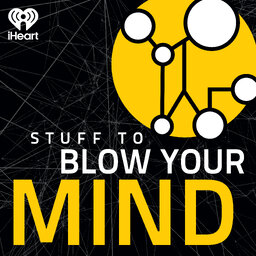From the Vault: Jump Into The Void
Ever wrestle with the illogical quasi-compulsion to throw yourself off a cliff or building? Don’t worry! You’re probably not suicidal, but merely touched by the 'call of the void' or 'high place phenomenon.' In this episode of the Stuff to Blow Your Mind podcast, Robert Lamb and Christian Sager explore some of the more enlightening theories about this experience.(Originally published Feb. 9, 2017)
Learn more about your ad-choices at https://www.iheartpodcastnetwork.com
In 1 playlist(s)
Stuff To Blow Your Mind
Deep in the back of your mind, you’ve always had the feeling that there’s something strange about re…Social links
Follow podcast
Recent clips

From the Vault: Mystery Cults, Part 3
1:03:47

Weirdhouse Cinema Rewind: Forbidden Planet
1:34:55

From the Vault: Mystery Cults, Part 2
53:07
 Stuff To Blow Your Mind
Stuff To Blow Your Mind